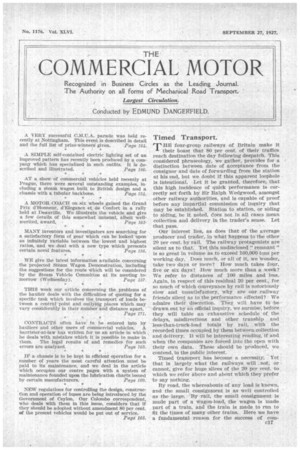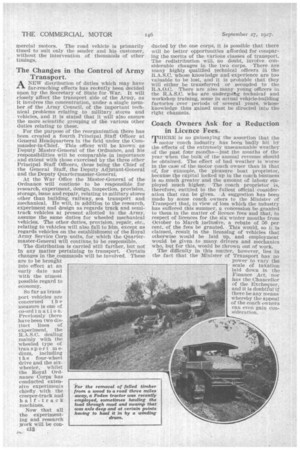Timed Transport.
Page 39

Page 40

If you've noticed an error in this article please click here to report it so we can fix it.
HE four-group railways Of Britain make it their boast that 80 per cent, of their traffics reach destination the day following despatch. This considered phraseology, we gather, provides for a distinction between date of acceptance from theconsignor and date of forwarding from the station at his end, but we doubt if this apparent loophole is intentional, Let it be granted, therefore, that this high incidence of quick performance is correctly set forth by Sir Ralph Wedgwood, amongst other railway authorities, and is capable of proof before any impartial commission of inquiry that May be established. Station to station, or siding to siding, be it noted, does not in all cases mean collection and delivery in the trader's sense. Let that pass.
Our interest lies, as does that of the average 'producer'and trader-, in what happens to the other 20 per cent. by rail. The railway rirotagonists are silent as to that. 'Yet this undisclosed " remnant " is so great in volume is to exceed 160,000 tons per working day. Does much, or all of it, we 'wonder, take two days or more? How much takes four, five or six days? How much more than a week? We refer to distances of 100 miles and less. Again, in respect of this residual 20 per cent„ for so much of which conveyance by rail is notoriously slow and unsatisfactory, why are our. railway friends silent as to the performance effected?: We admire their. discretion. They will have to%-be drawn ant by an official inquiry, we surmise, before they will table an exhaustive schedule of the delays, misdirections and other tranship and less-than-truck-load totals by "rail, with the recorded times occupied by them between collection and delivery. It will be interesting reading, if and when the companies are forced into the open with their own data. These should be produced, we contend, in the public interest. • Timed transport has become a necessity. Yet that is largely what the railways will . not, or cannot, give for huge slices of the 20 per cent, to which we refer above and about which they prefer to say nothing.
By road, the whereabouts of any load is known, and the small consignment is as well controlled as the large, By rail, the small consignment is made part of a wagon-load, the wagon. is made part of a train, and the train is made to run to fit the times of many other trains, Here we have a fundamental reason for the success of corn
mercial motors. The road vehicle is primarily timed to suit only the sender and his customer, without the intervention of thousands of other timings.
The Changes in the Control of Army Transport.
ANEW distribution of duties which may have far,reaching effects has recUtly been decided upon by the Secretary of State for War. It will closely affect the transport side of the Army, as it involves the concentration, under a single member of the Army Council, of the important technical problems relating to military stores and vehicles, and it is stated that it will also ensure the more scientific grouping of the various other duties relating to these.
For the purpose of the reorganization there has been created a fourth Principal Staff Officer at General Headquarters in the field under the Commander-in-Chief. This officer will be known as Deputy Master-General of the Ordnance, and his responsibilities will be comparable in importance and extent with those exercised by the three other Principal Staff Officers, these being the Chief of the General Staff, the Deputy Adjutant-General and the Deputy Quartermaster-General.
At the War Office the Master-General of the Ordnance will continue to be responsible for research, experiment, design, inspection, provision, storage, issue and repair, relating to military stores other than building, railway, sea transport and mechanical. He will, in addition to the research, experiment and design as regards track and semitrack vehicles at present allotted to the Army, assume the same duties for wheeled mechanical vehicles. The other duties, provision, repair, etc., relating to vehicles will also fall to him, except as regards vehicles on the establishment of the Royal Army Service Corp units, for which the Quartermaster-General will continue_ to be responsible.
The distribution is carried still farther, but not in any matter pertaining to transport. Certain changes in the commands will be involved. These are to be brought Into effect at an early date and with the utmost possible regard to economy,.
So far as transport vehicles are concerned t h e measure is one of co-ord inatio n. Previously there have been two distinct lines of experiment, the R:A.S.C. dealing mainly with the wheeled type of transport m edititn, including the four-wheel drive and the six-wheeler, whilst the Royal Ordnance Corps has conducted extensive experiments chiefly with the creeper-track and half-track machines.
Now that all the experiment ing and research work will be con ducted by the one corps, it is possible that there will be better opportunities afforded for comparing the merits of the various classes of transport. The redistribution will, no doubt, involve considerable changes in the two corps. There are many highly qualified technical officers in the R.A.S.C. whose knowledge and experience are too valuable to be lost, and it is probable that they will either be transferred or seconded to the R.A.O.C. There are also many young officers in the R.A.S.C. who are undergoitig technical and workshop training, some in actual vehicle-building factories over periods of several years, whose knowledge thus gained must be directed into the right channels.
Coach Owners Ask for a Reduction in Licence Fees.
MHERE is no gainsaying the assertion that the
motor coach industry has been badly hit by the effects of the extremely unseasonable weather of the past four months—just. the months of the year when the bulk of the annual revenue should be. obtained. The effect of bad weather is worse in the case of the motor poach owner than in that of, for example, the pleasure boat proprietor, because tl)e cgpital locked up in the coach business is so much greater and the amount of labour. employed much higher. The coach proprietor is, therefore, entitled to the fullest official consideration that can be given. A suggestion has been made by some coach owners to the Minister of Transport that, in view of loss which the industry has suffered this summer, a. concession be. granted to them in the matter of licence fees and that, in respect of licences for the six winter months front October to March inclusive, a rebate of 50 per cent, of the fees be granted. This would, so it. is claimed, result in the licensing of vehicles that otherwise would be laid up, and employment would be given to many drivers and mechanics who, but for this, would be thrown out of work.
The difficulty in this matter, however, lies in the fact that the Minister of Transport has no power to vary the scale of taxation laid down in the Finance Act, nor has the Chancellor of the Exchequer, and it is doubtful if there be any means whereby the appeal of the coach owners can even gain consideration.












































































































